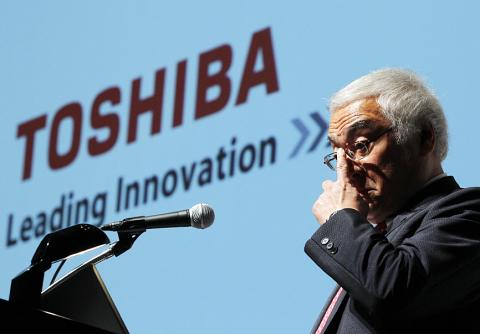Toshiba said yesterday it has stopped making televisions in Japan, citing slow domestic demand as falling prices, fierce global competition and a strong yen pressure the country’s electronics makers.
The IT-and-engineering conglomerate shuttered production lines at its last remaining domestic TV plant in Fukaya, near Tokyo, at the end of March, a company spokesman said.
Toshiba, the maker of the Regza brand of televisions, has shifted all of its television production to factories in China, Indonesia, Egypt and Poland, he said, adding: “The fall in domestic demand is the reason.”

Photo: Reuters
In Tokyo, Toshiba shares jumped 5.57 percent to close at ¥322.
The move is the latest development highlighting the plunging fortunes of Japan’s once world-beating electronics firms.
A strong yen, intense global competition — particularly from South Korean firms — and falling retail prices of televisions have left Japanese manufacturers swimming in red ink for the financial year that ended in March.
The industry received a temporary boost from a now-ended government stimulus program aimed at encouraging the purchase of energy-efficient appliances, but demand has slackened in an economy that has been limping along for many years.
Domestic television demand also surged when the nation stopped analogue broadcasting last July, by which time nearly all households and corporations had bought new televisions capable of receiving digital broadcasts.
“After those events, domestic demand fell so we have reduced production accordingly,” leading to a complete stoppage, the Toshiba spokesman said.
Japanese rival Hitachi, which earlier said it will stop domestic production of television sets and shift its business focus to large-scale infrastructure projects, said it expects higher operating profit for the current year.
Reports earlier this week said cash-bleeding Sony and Panasonic were looking to join forces to produce next-generation televisions in a bid to claw back market share from South Korean rivals.
Sharp, which is to get a cash injection from Taiwan’s Hon Hai Precision Industry Co (鴻海精密), better known for its Apple gadget-making Foxconn (富士康) brand, expects to remain in the red over the next year after a record US$4.7 billion net loss up to March this year.

Six Taiwanese companies, including contract chipmaker Taiwan Semiconductor Manufacturing Co. (TSMC), made the 2025 Fortune Global 500 list of the world’s largest firms by revenue. In a report published by New York-based Fortune magazine on Tuesday, Hon Hai Precision Industry Co. (better known as Foxconn) ranked highest among Taiwanese firms, placing 28th with revenue of US$213.69 billion. Up 60 spots from last year, TSMC rose 60 places to reach No. 126 with US$90.16 billion in revenue, followed by Quanta Computer Inc. at 348th, Pegatron Corp. at 461st, CPC Corp., Taiwan at 494th and Wistron Corp. at 496th. According to Fortune, the world’s

NEW PRODUCTS: MediaTek plans to roll out new products this quarter, including a flagship mobile phone chip and a GB10 chip that it is codeveloping with Nvidia Corp MediaTek Inc (聯發科) yesterday projected that revenue this quarter would dip by 7 to 13 percent to between NT$130.1 billion and NT$140 billion (US$4.38 billion and US$4.71 billion), compared with NT$150.37 billion last quarter, which it attributed to subdued front-loading demand and unfavorable foreign exchange rates. The Hsinchu-based chip designer said that the forecast factored in the negative effects of an estimated 6 percent appreciation of the New Taiwan dollar against the greenback. “As some demand has been pulled into the first half of the year and resulted in a different quarterly pattern, we expect the third quarter revenue to decline sequentially,”

WEAKER ACTIVITY: The sharpest deterioration was seen in the electronics and optical components sector, with the production index falling 13.2 points to 44.5 Taiwan’s manufacturing sector last month contracted for a second consecutive month, with the purchasing managers’ index (PMI) slipping to 48, reflecting ongoing caution over trade uncertainties, the Chung-Hua Institution for Economic Research (CIER, 中華經濟研究院) said yesterday. The decline reflects growing caution among companies amid uncertainty surrounding US tariffs, semiconductor duties and automotive import levies, and it is also likely linked to fading front-loading activity, CIER president Lien Hsien-ming (連賢明) said. “Some clients have started shifting orders to Southeast Asian countries where tariff regimes are already clear,” Lien told a news conference. Firms across the supply chain are also lowering stock levels to mitigate

DIVERSIFYING: Taiwanese investors are reassessing their preference for US dollar assets and moving toward Europe amid a global shift away from the greenback Taiwanese investors are reassessing their long-held preference for US-dollar assets, shifting their bets to Europe in the latest move by global investors away from the greenback. Taiwanese funds holding European assets have seen an influx of investments recently, pushing their combined value to NT$13.7 billion (US$461 million) as of the end of last month, the highest since 2019, according to data compiled by Bloomberg. Over the first half of this year, Taiwanese investors have also poured NT$14.1 billion into Europe-focused funds based overseas, bringing total assets up to NT$134.8 billion, according to data from the Securities Investment Trust and Consulting Association (SITCA),